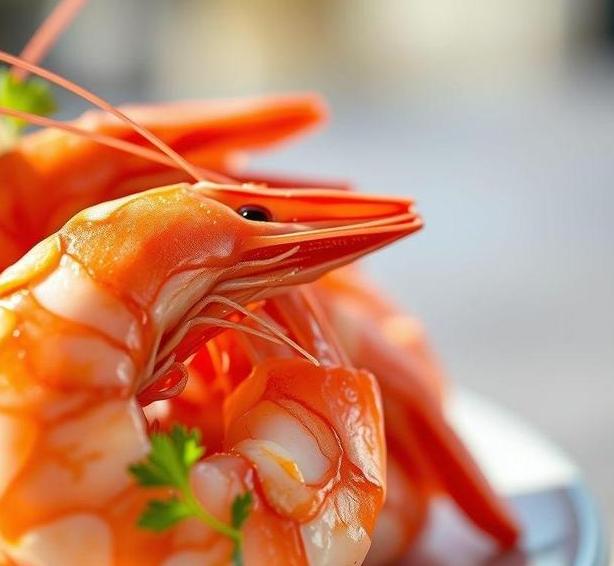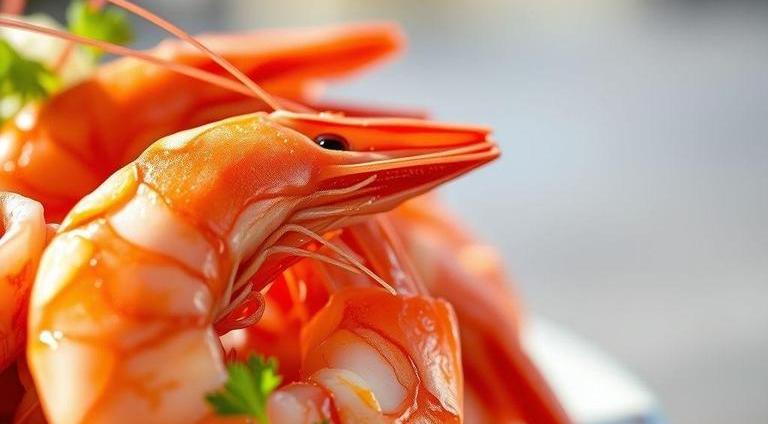Shrimp is a favorite for many-whether it’s boiled, grilled, or tossed in a flavorful dish, shrimp can elevate any meal. But if you’ve ever found yourself with leftover boiled shrimp and wondered how long you can keep it in the fridge or how to tell if it’s still safe to eat, you’re not alone. The shelf life of boiled shrimp can vary based on how it’s stored, how long it’s been kept, and a few other key factors. This guide will help you understand how long boiled shrimp lasts, how to spot when it’s gone bad, and the best ways to store it to keep it fresh.
So, let’s break down everything you need to know so you can enjoy your shrimp leftovers with confidence.
Can Boiled Shrimp Go Bad?
Absolutely, just like any perishable food, boiled shrimp can go bad. Shrimp, once boiled, contains proteins and moisture that make it a potential breeding ground for bacteria if left out or improperly stored. It’s vital to understand the environmental factors that influence its freshness.
- Temperature: If shrimp is left at room temperature for more than a couple of hours, it will begin to spoil quickly due to bacteria growth. The warmer the temperature, the faster bacteria will multiply, which is why it’s crucial to refrigerate or freeze shrimp promptly after cooking.
- Moisture: Shrimp naturally have a high moisture content, which can cause the shrimp to degrade faster if not stored correctly. Bacteria thrive in moist environments, especially in the presence of food particles.
So, while boiled shrimp can technically "last" for a while, its quality and safety largely depend on how it’s handled after cooking.
Shelf Life For Boiled Shrimp

When you store boiled shrimp properly, it can last a decent amount of time, but its quality will decrease over time. Let’s break down the shelf life in different storage scenarios:
-
In The Refrigerator
- Up to 3-4 days: When stored correctly in an airtight container, boiled shrimp can stay fresh for about 3 to 4 days in the fridge. The cooler temperature slows down bacterial growth, but it’s still important to keep it tightly sealed to prevent contamination.
-
In The Freezer
- Up to 3-6 months: Freezing boiled shrimp will extend its shelf life significantly. When frozen, shrimp can last anywhere from 3 to 6 months, though the texture may suffer slightly upon thawing. The key here is to wrap the shrimp well in plastic wrap, aluminum foil, or a vacuum-sealed bag to protect it from freezer burn.
-
At Room Temperature
- 1-2 hours: Boiled shrimp should not be left out at room temperature for more than 1 to 2 hours. If the temperature is above 90°F (like at a summer barbecue), it’s best to limit it to 1 hour.
The takeaway? If you know you won’t eat it within a few days, freezing is the best option. Otherwise, make sure to eat your refrigerated shrimp as soon as possible.
Common Signs Of Spoilage
Knowing when your boiled shrimp has gone bad can be tricky because, unlike some other foods, it might not show drastic changes immediately. Here are a few key things to look out for:
- Off Smell: The most immediate and obvious sign of spoilage is the smell. Fresh shrimp has a clean, ocean-like scent. Spoiled shrimp, on the other hand, will have a strong, pungent odor. It might even smell sour or “fishy”. Trust your nose-if it smells off, it’s best to toss it.
- Slimy Texture: Fresh shrimp should be firm and slightly springy. If your shrimp feels slimy, it’s a sign that bacteria or mold may be growing on it. This texture change is often accompanied by a noticeable change in its appearance as well.
- Color Change: While boiled shrimp is usually pale with a pinkish hue, it may start to take on a dull, grayish appearance when it’s no longer fresh. If the shrimp looks off-color or discolored in any way, it’s time to discard it.
- Soft or Mushy: When shrimp begins to spoil, it becomes mushy and loses its characteristic firmness. If it feels soft or falls apart when you handle it, it’s a strong indicator that the shrimp has gone bad.
- Visible Mold: If you see any greenish or black spots on your shrimp, discard it immediately. Mold growth is a clear sign that the shrimp is not safe to eat.
How To Store Boiled Shrimp?

Proper storage is key to extending the shelf life and maintaining the quality of your boiled shrimp. Here’s how you should go about storing it:
-
Refrigeration
- After boiling shrimp, let it cool down to room temperature (but don’t leave it out for more than two hours!). Once it has cooled, transfer the shrimp into an airtight container or wrap it tightly with plastic wrap or aluminum foil. Make sure there is minimal air exposure, as this can contribute to spoilage.
- It’s best to store the shrimp in the coldest part of your refrigerator (usually near the back) to keep it at a consistent temperature. Do not leave it in the door, as the temperature fluctuates each time you open it.
-
Freezing
- If you need to keep shrimp longer than a few days, freezing is your best option. The key to preserving the texture and flavor is to make sure it’s sealed properly.
- Wrap the shrimp tightly in plastic wrap, and then place it in a resealable freezer bag or vacuum-sealed bag. The less air exposure, the better. You can also store the shrimp in an airtight container that’s labeled with the date, so you remember how long it’s been frozen.
- When freezing shrimp, it’s helpful to portion it into smaller amounts so you can thaw only what you need.
-
Thawing
- The best way to thaw frozen shrimp is by transferring it to the refrigerator the night before you plan to use it. If you’re in a rush, you can thaw it under cold running water or use the microwave, though the texture might not be as good as when it’s slowly thawed.
Expert Tips
- Don’t Boil Too Much Shrimp at Once: If you’re boiling shrimp for a meal, it’s better to boil in smaller batches so you can keep the leftover shrimp fresh. This way, you won’t be storing excessive amounts of shrimp in the fridge at once.
- Avoid Overcooking: Overcooked shrimp become tough and rubbery. This makes them less enjoyable to eat later, even if they are stored properly. When boiling shrimp, make sure to stop cooking once they turn pink and opaque, typically in about 2-3 minutes depending on the size.
- Make Use of Leftovers: If you have leftover boiled shrimp, don’t just toss it into the fridge and forget about it. Use it in dishes like shrimp pasta, salads, or tacos, which allow you to get the most out of your leftovers while ensuring they stay fresh.
- Invest in a Good Freezer Bag: For freezing shrimp, a vacuum-seal bag is a good investment if you plan to do this often. It removes air and locks in freshness much better than a standard freezer bag.
FAQs
How Long Can Boiled Shrimp Last In The Fridge?
Boiled shrimp can last in the refrigerator for 3 to 4 days when stored properly in an airtight container. If it is left out at room temperature for more than 2 hours, it should be discarded to prevent foodborne illness.
Can Boiled Shrimp Go Bad If Frozen?
Yes, boiled shrimp can go bad if frozen for too long. While freezing can extend its shelf life to about 6 months, shrimp may lose flavor and texture after that period.
What Are Signs That Boiled Shrimp Has Gone Bad?
Signs of spoiled boiled shrimp include an off-putting or sour odor, slimy texture, discoloration (such as gray or brown spots), and a mushy or overly soft feel. If you notice any of these, discard the shrimp.
Can You Eat Boiled Shrimp After 5 Days In The Fridge?
It is not recommended to eat boiled shrimp after 5 days in the fridge. Although it may still appear safe, it is best to consume shrimp within 3 to 4 days to avoid potential food safety risks.
Can Boiled Shrimp Go Bad If Left Out Overnight?
Yes, boiled shrimp should not be left out overnight. If left at room temperature for more than 2 hours, bacteria can rapidly grow, increasing the risk of foodborne illnesses.
How Can I Properly Store Boiled Shrimp To Prevent It From Going Bad?
To properly store boiled shrimp, place it in an airtight container or tightly wrap it in plastic wrap or aluminum foil. Keep it in the coldest part of the refrigerator (usually the back) or freeze it if you plan to keep it for a longer period.
Is It Safe To Eat Boiled Shrimp If It Has An Unusual Smell?
No, an unusual or foul odor is a strong indicator that the shrimp has spoiled. If your boiled shrimp smells sour, rotten, or fishy, it is best to discard it.
Can Boiled Shrimp Still Go Bad After Being Reheated?
Yes, boiled shrimp can go bad after being reheated if it wasn’t stored correctly or if it has been sitting out too long. Reheating may not prevent bacteria growth, so it is important to store and handle shrimp properly.
How Long Can Boiled Shrimp Stay In The Freezer?
Boiled shrimp can be stored in the freezer for up to 6 months. However, for the best flavor and texture, it is recommended to eat it within 3 months.
Can You Tell If Boiled Shrimp Has Gone Bad Just By Looking At It?
While discoloration or visible mold can indicate spoilage, you should also check the shrimp’s texture and smell. A slimy or mushy texture and any sour or rotten smell are clear signs that boiled shrimp has gone bad.